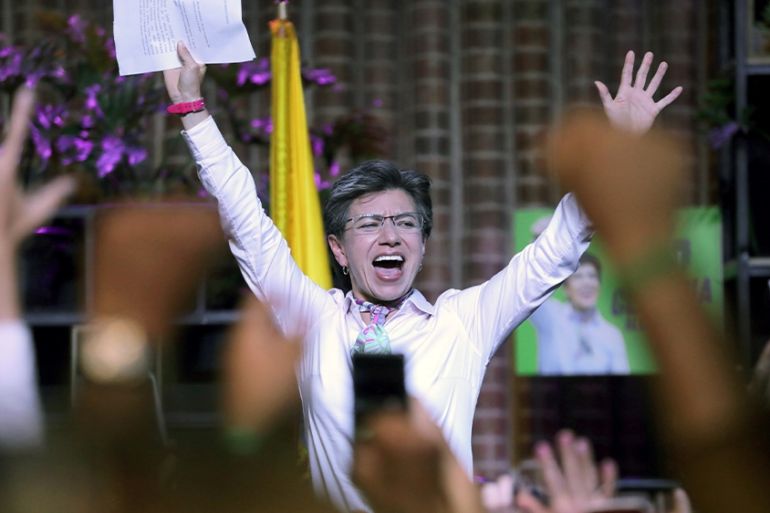‘What you see is what you get’: Bogota elects first woman mayor
Left-wing Claudia Lopez is known for her straight-talking approach and commitment to fighting corruption.

Bogota, Colombia – Colombians made history on Sunday by electing a woman mayor in Bogota as they took to the polls in local and regional elections for the first time since the signing of a landmark 2016 peace deal.
Journalist-turned-politician Claudia Lopez, 49, is part of the Green Alliance party. A former senator, she was vice-presidential candidate in the 2018 election.
Keep reading
list of 3 itemsColombia elections: Candidates face spate of violence
Armoured cars scarce as Colombia elections near
The position of mayor of Bogota, the capital, is as the most influential political position in Colombia, after the presidency.
“Claudia Lopez’s win in Bogota is historical on several levels,” said Arlene Tickner, political science professor at Rosario University.
“She will be the first woman and the first openly-gay politician to occupy the second most important elected office in Colombia, and her long-standing fight against corruption will hopefully create a battle cry that other like-minded elected officials throughout Colombia can join.”
|
|
Sunday’s elections were the first at the regional and local level since the signing of the controversial peace deal between the government and the Revolutionary Armed Forces of Colombia (FARC), which ended a bloody 52-year long conflict.
Brash and forthright
Lopez’s brash style of speaking and strong opposition to Colombia’s right-wing politicians made her popular with left and centre voters, but public opinion on her election was mixed. She won 35 percent of the vote to secure victory.
“It’s very sad,” Haide Caldas, a 69-year-old Bogota shopkeeper told Al Jazeera an hour after Lopez’s victory announcement. “I don’t think she’s a good option. She doesn’t seem like a person with clearly defined thoughts and her opinion fluctuates from one day to another.”
Pia Quiroga, 44, a teacher who voted for Lopez said, “It’s marvellous, we’re so happy. She’s going to manage the city really well and with less corruption.”
Lopez is one of the first openly lesbian politicians in Colombia along with her partner Angelica Lozano, also a politician and member of Green Alliance. Both have advocated for LGBT+ issues in Colombia throughout their careers.
Johana Rincon, 29, teacher, said as a woman and lesbian, she felt Lopez’s diversity was a “good thing for Bogota and Colombia,” and 43-year-old designer Oscar Ospina said it was “great a woman has the chance to take up the position”.
“She’s a bit scandalous and overreacts a bit, but she also has a good personality,” Ospina said.

Shift to left
Others see her blunt and straightforward way of doing things as refreshing.
“I love her,” said 69-year-old jewellery seller, Lucia Garcia.
“I think she’s fascinating. She does things heads on and what you see is what you get. I’ve 100 percent faith in her and I’m so happy.”
In congress, Lopez once called former president Alvaro Uribe “a leech running to the sewer”.
Perdimos, reconozco la derrota con humildad. La lucha por la democracia no tiene fin.
— Álvaro Uribe Vélez (@AlvaroUribeVel) October 27, 2019
Ulribe, a conservative, acknowledged the strong showing of centrist and left-leaning candidates, in a tweet.
“We lost, I recognise the defeat with humility. The fight for democracy has no end.”
In 2013 Lopez briefly left Colombia after receiving death threats for her research on paramilitary activity in politics.
She has long fought against corruption in Colombia and in August 2018 tried unsuccessfully to pass a citizen-driven anti-corruption bill.
“Claudia has been rhetorically very strong against corruption and it’s likely she makes it the centrepiece of her administration,” said Sergio Guzman, a political analyst.
“Her election is a good news story for alternative political movements for demonstrating a much stronger ideological position than traditional parties.”